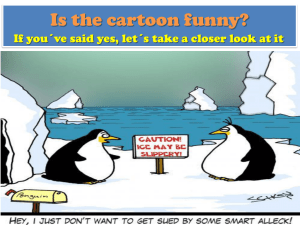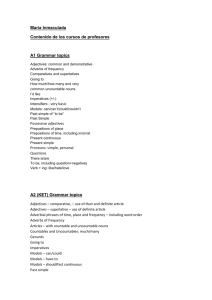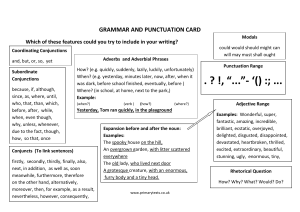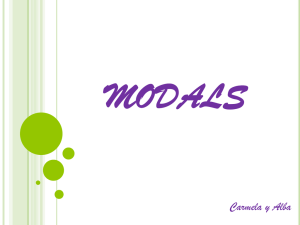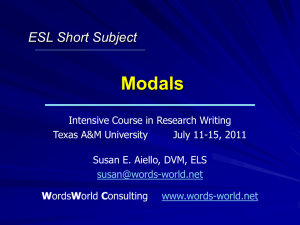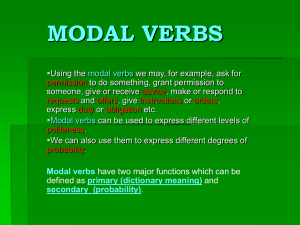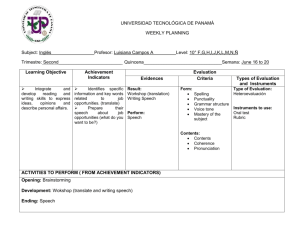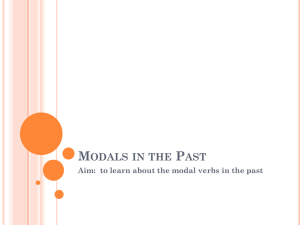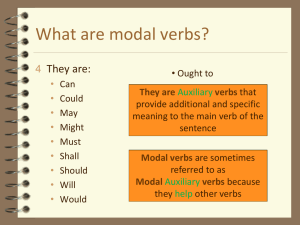Modals & Similar Expressions
advertisement
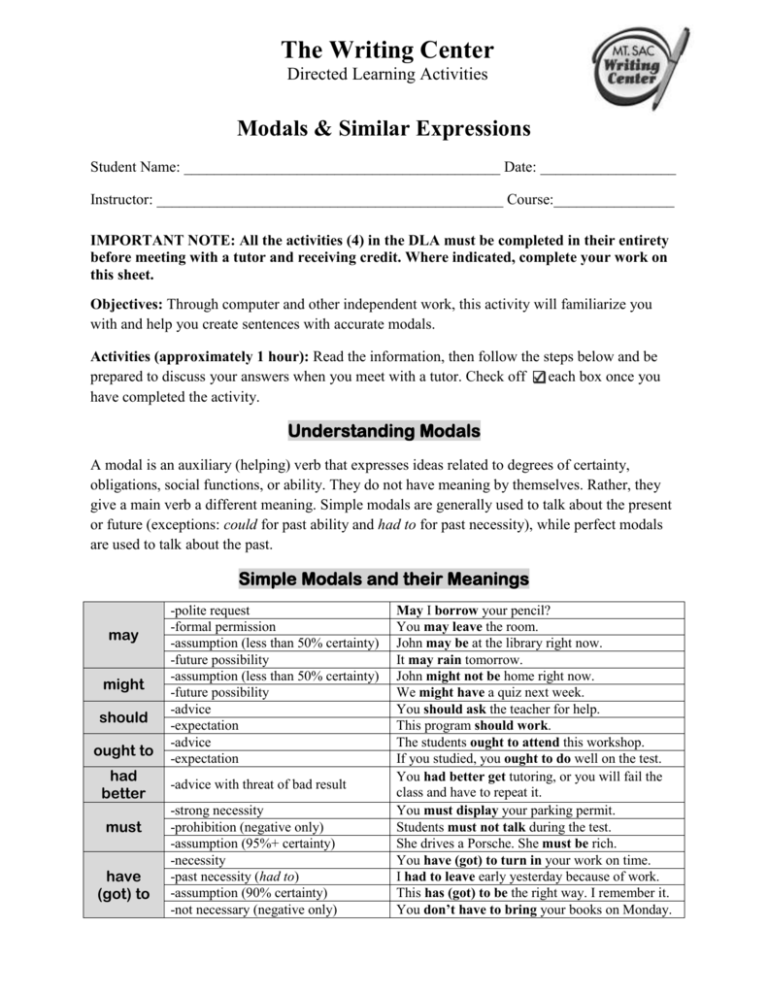
The Writing Center
Directed Learning Activities
Modals & Similar Expressions
Student Name: __________________________________________ Date: __________________
Instructor: ______________________________________________ Course:________________
IMPORTANT NOTE: All the activities (4) in the DLA must be completed in their entirety
before meeting with a tutor and receiving credit. Where indicated, complete your work on
this sheet.
Objectives: Through computer and other independent work, this activity will familiarize you
with and help you create sentences with accurate modals.
Activities (approximately 1 hour): Read the information, then follow the steps below and be
prepared to discuss your answers when you meet with a tutor. Check off
each box once you
have completed the activity.
Understanding Modals
A modal is an auxiliary (helping) verb that expresses ideas related to degrees of certainty,
obligations, social functions, or ability. They do not have meaning by themselves. Rather, they
give a main verb a different meaning. Simple modals are generally used to talk about the present
or future (exceptions: could for past ability and had to for past necessity), while perfect modals
are used to talk about the past.
Simple Modals and their Meanings
may
might
should
ought to
had
better
must
have
(got) to
-polite request
-formal permission
-assumption (less than 50% certainty)
-future possibility
-assumption (less than 50% certainty)
-future possibility
-advice
-expectation
-advice
-expectation
-advice with threat of bad result
-strong necessity
-prohibition (negative only)
-assumption (95%+ certainty)
-necessity
-past necessity (had to)
-assumption (90% certainty)
-not necessary (negative only)
May I borrow your pencil?
You may leave the room.
John may be at the library right now.
It may rain tomorrow.
John might not be home right now.
We might have a quiz next week.
You should ask the teacher for help.
This program should work.
The students ought to attend this workshop.
If you studied, you ought to do well on the test.
You had better get tutoring, or you will fail the
class and have to repeat it.
You must display your parking permit.
Students must not talk during the test.
She drives a Porsche. She must be rich.
You have (got) to turn in your work on time.
I had to leave early yesterday because of work.
This has (got) to be the right way. I remember it.
You don’t have to bring your books on Monday.
DLA: Modals & Similar Expressions 2
can
could
would
shall
will
be
able to
-ability/possibility
-informal polite request
-informal permission
-impossibility (negative only)
-informal prohibition (negative only)
-inability (negative only)
-past ability
-polite request
-assumption (less than 50% certainty)
-future possibility
-impossibility (negative only)
-polite request
-past habit
-desire/intent (unreal conditionals)
-polite suggestion
-future
-predictions
-voluntary actions
-promises
-invitations/requests
-ability (can be used in any tense)
I can drive manual transmission.
Can I borrow your pencil?
You can use my book if you want.
This can’t be the right way! I think we’re lost.
Students can’t talk during the test.
I can’t reach the top shelf because I’m too short.
I could run fast when I was a child.
Could I borrow your pencil?
The teacher’s absent. He could be sick.
It could rain tomorrow.
This couldn’t be the right way. I think we’re lost.
Would you please pass the salt?
We would go to the park every week as children.
If had money, I would travel around the world.
Shall we dance?
I shall arrive soon.
Someday, robots will rule the world.
*phone rings* I’ll get it!
I’ll pay you back.
Will you come to my party?
I’m sorry that I wasn’t able to come to your
party, but I had to work.
How to Form Verbs with Simple Modals
{ modal + BASE form of the verb }
Modal verbs are special verbs which behave very differently from normal verbs. Here are some
rules to remember:
1. Modals do not take -s in the third person. *Exception: have (got) to She has to go.
Tom must take a break.
Elise should see the counselor.
2. Several modal verbs cannot be used in the past tenses or the future tenses.
She will can give us a ride to the airport tomorrow.
He must leave early yesterday.
3. Most modals are followed by only the base form of the verb and are not used alone unless
there is a clear connection to a main verb. ExampleWill you take me? Yes, I will.
Will could saw see the fireworks from his bedroom window.
Hillary should [save] her money.
4. Do not use to unnecessarily: *Exceptions: ought to, have (got) to, be able to
We had better to leave now.
DLA: Modals & Similar Expressions 3
5. Do not use double modals: *Exceptions: be able to You won’t be able to register.
She might can help me.
Perfect Modals and their Meanings
may
have
might
have
should
have
ought to
have
must
have
had to
have
could
have
would
have
-past possibility (not certain)
-past possibility (not certain)
-blame/complaint
-possible result of unreal situation
-regret
-past expectation
-regret
-past expectation
-assumption about the past
(certain)
-assumption about the past
(certain)
-past suggestion
-past possibility (not certain)
-past impossibility (negative only)
-possible result of past unreal
situation
-certain result of past unreal
situation
John may have been at the library yesterday. He
wasn’t home when I called him.
John might have been at the library yesterday. He
wasn’t home when I called him.
The event was cancelled. You might have called me.
If they had invited me, I might have gone.
You should have asked the teacher for help.
I studied, so I should have passed the test.
You ought to have studied for the test.
I studied, so I ought to have passed the test.
Heidi must not have felt very good yesterday. She
didn’t show up to work.
Heidi had to have been sick yesterday. She didn’t
show up to work.
You could have talked to your professor.
John could have been at the library yesterday.
He couldn’t have eaten the whole pizza by himself.
If you had called me earlier, I could’ve given you a
ride to the airport.
I would have made you a sandwich if I had known
you were hungry.
How to Form Verbs with Perfect Modals
{ modal + HAVE + past participle }
ExI should have taken that class earlier.
Do not use the past form of the verb. You need to use the past participle, which sometimes looks
like the past form, but other times it does not. Here are some verbs and their past participles:
Simple Form
Past Participle
Simple Form
Past Participle
Simple Form
Past Participle
awake
awoken
get
gotten
see
seen
be
been
give
given
sell
sold
become
become
go
gone
send
sent
begin
begun
grow
grown
sing
sung
blow
blown
have
had
sit
sat
break
broken
hear
heard
sleep
slept
buy
bought
keep
kept
speak
spoken
DLA: Modals & Similar Expressions 4
catch
caught
know
known
stand
stood
choose
chosen
lay
laid
steal
stolen
come
come
leave
left
sweep
swept
do
done
lie
lain
swim
swum
draw
drawn
lose
lost
take
taken
drink
drunk
make
made
teach
taught
drive
driven
mean
meant
tell
told
eat
eaten
meet
met
think
thought
fall
fallen
pay
paid
throw
thrown
feel
felt
ride
ridden
understand
understood
find
found
rise
risen
wear
worn
fly
flown
run
run
win
won
forget
forgotten
say
said
write
written
How to Make Questions and Negative Statements
Negative statements: Start with the subject , then the modal, followed by not, and then the
rest of the verb.
Ex I will pay you back.
I will not pay you back.
We should go.
She must have seen me.
We should not go.
She must not have seen me.
Questions: Start with the modal, then the subject , and then the rest of the verb. You can add a
wh- word at the beginning if you need it.
Ex She must finish the project.
I should attend.
They could have returned the key.
Must she finish the project?
Should I attend?
Could they have returned the key?
Why must she finish it?
Which should I attend?
How could they have returned it?
* Have (got) to agrees with the subject and needs a helper for questions and negative statements.
Ex I have (got) to go.
He has to go.
We have to go.
I do not have (got) to go.
He does not have to go.
We do not have to go.
Do I have to go?
Does he have to go?
Do we have to go?
Where do I have to go?
Why does he have to go?
When do we have to go?
DLA: Modals & Similar Expressions 5
Other Modals
Modal verbs can be used in a variety of different forms. There are progressive modals (You
should be studying right now.), perfect progressive modals (You should have been studying
instead of watching TV.), and even passive modals (Precaution should be taken.), among others.
1. Review the information on this sheet. Then, answer the following questions.
What are modals? _________________________________________________________
_________________________________________________________________________
List three rules about modals. ________________________________________________
_________________________________________________________________________
2. Open your internet browser and go to http://englishpage.com/modals/interactivemodal8.htm.
Complete the Modal Final Test by choosing the correct form to fill in the blank. After you
finish, click “Check,” and then PLEASE ASK A LAB TUTOR TO PRINT THE PAGE
THAT HAS YOUR SCORE. DO NOT EXIT THE PROGRAM UNTIL THE TUTOR
HAS PRINTED THIS PAGE (FREE OF CHARGE).
3a. Collect some of your graded work. Find FIVE different sentences that have modal errors.
Write them down below, and then write the corrected sentence with the appropriate
adjective below the original sentence.
ExOriginal sentence:
John must left early yesterday.
Corrected sentence: John had to leave early yesterday.
1. a. Original sentence:______________________________________________________
_______________________________________________________________________.
b. Corrected sentence: _____________________________________________________
_______________________________________________________________________.
2. a. Original sentence: ______________________________________________________
_______________________________________________________________________.
b. Corrected sentence: _____________________________________________________
DLA: Modals & Similar Expressions 6
_______________________________________________________________________.
3. a. Original sentence: ______________________________________________________
_______________________________________________________________________.
b. Corrected sentence: _____________________________________________________
_______________________________________________________________________.
4. a. Original sentence: ______________________________________________________
_______________________________________________________________________.
b. Corrected sentence: _____________________________________________________
_______________________________________________________________________.
5. a. Original sentence: ______________________________________________________
_______________________________________________________________________.
b. Corrected sentence: _____________________________________________________
_______________________________________________________________________.
If you do not have your own essay to work with, please complete the supplemental activity
below (3b).
3b. Make sentences using the following modals correctly.
1.) must have (assumption about the past): ___________________________________________
_____________________________________________________________________________.
2.) have got to (necessity): ________________________________________________________
_____________________________________________________________________________.
3.) ought to (advice): ____________________________________________________________
_____________________________________________________________________________.
DLA: Modals & Similar Expressions 7
4.) could have (past suggestion) ____________________________________________________
_____________________________________________________________________________.
5.) may (future possibility): _______________________________________________________
_____________________________________________________________________________.
6.) might (assumption): __________________________________________________________
_____________________________________________________________________________.
7.) should (expectation): _________________________________________________________
_____________________________________________________________________________.
8.) should have (regret): _________________________________________________________
_____________________________________________________________________________.
9.) may have (past possibility): ____________________________________________________
_____________________________________________________________________________.
10.) ought to have (past expectation): _______________________________________________
_____________________________________________________________________________.
4. Review: Sign up to see a tutor on the “DLA Walk-in” list. During your session with a tutor,
explain your work to demonstrate your understanding of modals and similar expressions. Refer
to your own graded writing (or the completed activity) and explain to the tutor strategies that you
used to create sentences with accurate modals and similar expressions.
Student’s signature: ______________________________________________ Date: __________
Tutor’s signature: ________________________________________________ Date: _________
IMPORTANT NOTE: All the activities (3) in this DLA must be completed in their entirety
before meeting with a tutor and receiving credit. If your instructor wants evidence of this
completed DLA, return this form to him or her with the tutor’s signature included.
